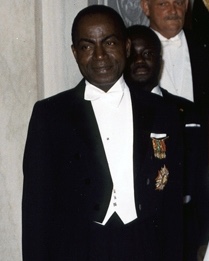Houphouet-Boigny
| Félix Houphouët-Boigny | |
|---|---|
 |
|
| 1st President of Côte d'Ivoire | |
|
In office 3 November 1960 – 7 December 1993 |
|
| Preceded by | None (position first established) |
| Succeeded by | Henri Konan Bédié |
| 1st Prime Minister of Côte d'Ivoire | |
|
In office 7 August 1960 – 27 November 1960 |
|
| Preceded by | None (position first established) |
| Succeeded by | None (position abolished) |
| Personal details | |
| Born |
Dia Houphouët 18 October 1905 Yamoussoukro, French West Africa |
| Died | 7 December 1993 (aged 88) Ivory Coast |
| Nationality | Ivorian |
| Political party | Democratic Party of Côte d'Ivoire |
| Spouse(s) | Kady Racine Sow (1930–1952; divorced) Marie-Thérèse Houphouët-Boigny (1962–1993; his death) |
Félix Houphouët-Boigny ([feliks ufwɛ(t) bwaɲi]; 18 October 1905 – 7 December 1993), affectionately called Papa Houphouët or Le Vieux (The Old One), was the first President of Ivory Coast (1960 to 1993), serving for more than three decades until his death. A tribal chief, he worked as a medical aide, union leader, and planter before being elected to the French Parliament. He served in several ministerial positions within the French government before leading Côte d'Ivoire following independence in 1960. Throughout his life, he played a significant role in politics and the decolonization of Africa.
Under Houphouët-Boigny's politically moderate leadership, Ivory Coast prospered economically. This success, uncommon in poverty-ridden West Africa, became known as the "Ivorian miracle" and was due to a combination of sound planning, the maintenance of strong ties with the West (particularly France), and development of the country's significant coffee and cocoa industries. However, the exploitation of the agricultural sector caused difficulties in 1980, after a sharp drop in the prices of coffee and cocoa.
Throughout his presidency, Houphouët-Boigny maintained a close relationship with France, a policy known as Françafrique, and he built a close friendship with Jacques Foccart, the chief adviser on African policy in the de Gaulle and Pompidou governments. He aided the conspirators who ousted Kwame Nkrumah from power in Ghana in 1966, took part in the failed coup against Mathieu Kérékou in Benin in 1977, and was suspected of involvement in the 1987 coup that removed Thomas Sankara from power in Burkina Faso. Houphouët-Boigny maintained a strong anti-communist foreign policy, which resulted in, among other things, severing diplomatic relations with the Soviet Union in 1969 (after first establishing relations in 1967) and refusing to recognise the People's Republic of China until 1983. He provided assistance to UNITA, a United States-supported, anti-communist rebel movement in Angola. In 1986 he re-established relations with the Soviet Union, shortly before the fall of its confederation.
...
Wikipedia
